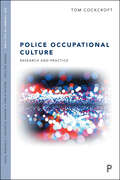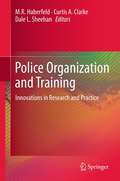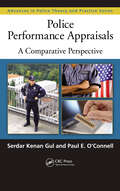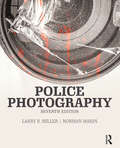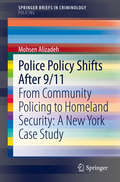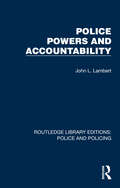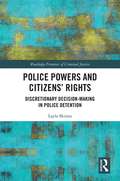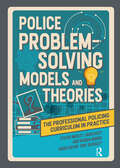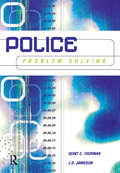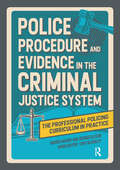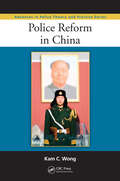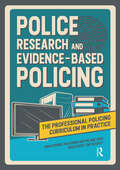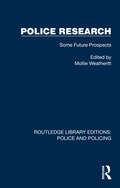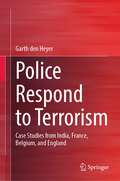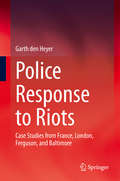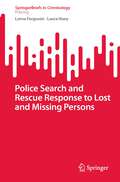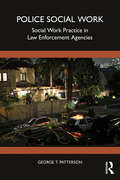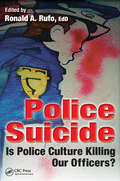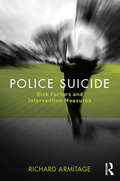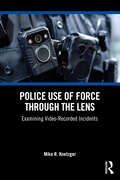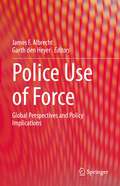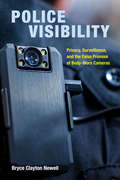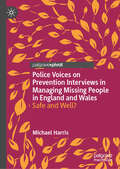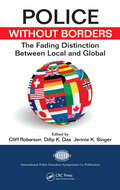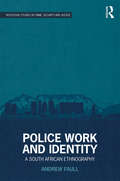- Table View
- List View
Police Occupational Culture: Research and Practice (Key Themes in Policing)
by Tom CockcroftTaking an evidence-based approach to understanding police culture, this thorough and accessible book critically reviews existing research and offers new insights on theories and definitions. Tom Cockcroft, an authority on the subject, addresses a range of contemporary issues including diversity, police reform and police professionalisation. This invaluable review: - Identifies and discusses differing conceptions of police culture; - Explores the contribution of different disciplinary and methodological approaches to our understanding of police culture; - Assesses how culture relates to many different operational aspects of policing; - Contextualises our understanding of police culture in relation to both contemporary police agendas and wider social change. For students, researchers and police officers alike, this is an accessible and timely appraisal of police culture.
Police Organization and Training
by M. R. Haberfeld Dale L. Sheehan Curtis A. ClarkeCriminal enterprises are growing in sophistication. Terrorism is an ongoing security threat. The general public is more knowledgeable about legal matters. These developments, among others, necessitate new methods in police work--and in training new recruits and in-service officers. Given these challenges, improvements in training are a vital means of both staying ahead of lawbreakers and delivering the most effective services to the community. Police Organization and Training surveys innovations in law enforcement training in its evolution from military-style models toward continuing professional development, improved investigation methods, and overall best practices. International dispatches by training practitioners, academics, and other experts from the US, the UK, Canada, Germany, Hong Kong, and elsewhere emphasize blended education methods, competency-building curricula, program and policy development, and leadership concepts. These emerging paradigms and technologies, coupled with a clear focus on ethical issues, provide a lucid picture of the future of police training in both educational and law enforcement contexts. In addition, the book's training templates are not only instructive but also adaptable to different locales. Featured in the coverage: Simulation technology as a training tool, the Investigation Skill Education Program and the Professionalizing Investigation Program, redesigning specialized advanced criminal investigation and training, a situation-oriented approach to addressing potentially dangerous situations, developments in United Nations peacekeeping training and combating modern piracy Police Organization and Training is a key resource for researcher sand policymakers in comparative criminal justice, police and public administration, and police training academies. It also has considerable utility as a classroom text in courses on policing and police administration. Includes a forward by Ronald K Noble, Secretary General of INTERPOL.
Police Performance Appraisals: A Comparative Perspective (Advances in Police Theory and Practice)
by Paul O'Connell Serdar Kenan GulPolice performance appraisal is one of the most important components of law enforcement management affecting the quality of the services a department delivers as well as the satisfaction of its employees. Therefore, it is crucial that the performance appraisal process is conducted in an effective and equitable manner. Police Performance Appraisals:
Police Photography
by Larry S. Miller Norman MarinQuality photographs of evidence can communicate details about crime scenes that otherwise may go unnoticed, making skilled forensic photographers invaluable assets to modern police departments. For those seeking a current and concise guide to the skills necessary in forensic photography, Police Photography , Seventh Edition, provides both introductory and more advanced information about the techniques of police documentation. Completely updated to include information about the latest equipment and techniques recommended for high-quality digital forensic photography, this new edition thoroughly describes the techniques necessary for documenting a range of crime scenes and types of evidence, including homicides, arson, and vehicle incidents. With additional coverage of topics beyond crime scenes, such as surveillance and identification photography, Police Photography , Seventh Edition is an important resource for students and professionals alike.
Police Policy Shifts After 9/11: From Community Policing to Homeland Security: A New York Case Study (SpringerBriefs in Criminology)
by Mohsen AlizadehThis volume addresses the impact of the September 11th terror attacks on funded programs in policing. Comparing New York City's policing, community policing, and homeland security programs, this brief examines twenty-four years of federal grants to identify shifts in policy. Using focusing events and moral panic theories, it posits that 9/11 served as a catalyst to change public policy, moving policing programs in the direction of homeland security. With a before-after-study design, this volume empirically assesses policy shifts to better understand the influence of events and of funding on policing models. This brief will be useful to researchers of policing, law enforcement officials, and policymakers.
Police Powers and Accountability (Routledge Library Editions: Police and Policing)
by John L. LambertThe traditional view of the role of the police had come under increasing attacks in the early 1980s. The riots of 1981 and the Scarman Inquiry stimulated a widespread public debate about policing, police powers and accountability. It had become clear that the police did not simply enforce the law. They also made policy about what law to enforce, when to enforce it and against whom to enforce it. It was the control of this discretionary power which was at the heart of the debate at the time. Originally published in 1986, this book considers these critical issues in contemporary policing. It concentrates on those aspects of policing that were usually covered in law and law related courses. It deals with the constitutional framework within which the police operates. It examines the police complaints procedure and the full range of police powers against the background of the political debate at the time. Throughout the book the 1984 Police and Criminal Evidence Act is discussed in detail and its impact upon police and public alike is analysed.
Police Powers and Citizens’ Rights: Discretionary Decision-Making in Police Detention (Routledge Frontiers of Criminal Justice)
by Layla SkinnsPolice detention is the place where suspects are taken whilst their case is investigated and a case disposal decision is reached. It is also a largely hidden, but vital, part of police work and an under-explored aspect of police studies. This book provides a much-needed comparative perspective on police detention. It examines variations in the relationship between police powers and citizens’ rights inside police detention in cities in four jurisdictions (in Australia, England, Ireland and the US), exploring in particular the relative influence of discretion, the law and other rule structures on police practices, as well as seeking to explain why these variations arise and what they reveal about state-citizen relations in neoliberal democracies. This book draws on data collected in a multi-method study in five cities in Australia, England, Ireland and the US. This entailed 480 hours of observation, as well as 71 semi-structured interviews with police officers and detainees. Aside from filling in the gaps in the existing research, this book makes a significant contribution to debates about the links between police practices and neoliberalism. In particular, it examines the police, not just the prison, as a site of neoliberal governance. By combining the empirical with the theoretical, the main themes of the book are likely to be of utmost importance to contemporary discussions about police work in increasingly unequal societies. As a result, it will also have a wide appeal to scholars and students, particularly in criminology and criminal justice.
Police Problem Solving Models and Theories (The Professional Policing Curriculum in Practice)
by Steve Wadley Laura Riley Sharda MurriaAddresses the policing models and concepts which underpin officers' daily decision making. It clearly relates theory to practice and promotes transferrable skills including critical thinking and case study analysis.This book offers the reader a comprehensive understanding of problem-solving models and policing theory. The approach bridges the gap between academic understanding and practical considerations, and situates police decision making within ethical frameworks adopted by police services in England and Wales. It also draws attention to the legislation which underpins the context of problem solving and the policies which inform this. Models are discussed in relation to theoretical underpinnings and implementation is examined through policy and legislation, historical success and limitations.Critical thinking is a must for all police officers present and future and, as such, readers are challenged to consider decision making and the impact of their choices for both themselves as police officers and the wider community that they will go on to serve. Chapters cover neighbourhood, 'hot spot' and predictive policing, rational choice theory, situational crime prevention and partnership working. Readers can benefit from reading the text cover to cover to gain a developing understanding of the topic, or they can use it to reference key principles and ideas.This text is part of the Professional Policing Curriculum in Practice series.
Police Problem Solving: Controversies, Challenges, And Solutions - An Anthology (Controversies In Crime And Justice Ser.)
by J. D. Jamieson Quint ThurmanOffering a balanced approach to problem-solving issues in a complex and changing world, this book focuses specifically on the subject of problem solving in policing. Featured selections include chapters on domestic security, disorderly youth, auto theft, prostitution, gang delinquency and crime in public housing. Other notable selections discuss the role of supervising police personnel engaged in problem solving, advances in using this approach in criminal investigations, solving serial crimes, preparing for terrorism, and developing patrol officers as effective first responders to active violence.
Police Procedure and Evidence in the Criminal Justice System (The Professional Policing Curriculum in Practice)
by Barrie Archer George EllisonPolice procedure and evidence brought to life!A key text for all those on policing degree or other pre-join routes, this book examines police procedure and evidence in the criminal justice system, providing clear and accessible information while encouraging analysis and reflection. Chapters cover police powers, stop and search, arrest and custody, disposals, court procedures and disclosure, and rehabilitation. Uniquely it follows the journey of a fictional family who all in one way or another become involved in the criminal justice system, allowing students to consider a range of possible options and outcomes and bringing the theory to life.
Police Reform in China (Advances in Police Theory and Practice)
by Kam C. WongSweeping changes have altered the cultural landscape of China. This volume provides an insightful glimpse of policing in the midst of such change. Beginning with a historical account of police reform in the region since 2000, it discusses the difficulties encountered in trying to understand Chinese policing. Demonstrating how old ideologies are increasingly in conflict with the values and lifestyles of a new mentality, the book discusses steps that can be taken to improve professionalism. The final chapters highlight the importance of understanding the Chinese people, culture, values, and interests in order to truly effectuate successful police reform.
Police Research and Evidence-based Policing (The Professional Policing Curriculum in Practice)
by Craig Hughes Emma Spooner Phil Mike JonesEvidence-based policing is a core part of the National Policing Curriculum but policing students and new officers often feel daunted by the prospect of understanding research and how to use it to inform decision making in practice. This text helps readers develop a sound understanding of evidence-based practice in policing and contextualises the research process by explaining how it supports practice within the workplace. It clearly relates research to the investigative process, combining academic theory and operational understanding using relevant case studies and scenarios, and identifies the main approaches employed. It explores how evidence from research can be used to inform and develop critical arguments central to policing practice and signposts students to key sources of information.The Professional Policing Curriculum in Practice is a new series of books that match the requirements of the new pre-join policing qualifications. The texts reflect modern policing, are up-to-date and relevant, and grounded in practice. They reflect the challenges faced by new students, linking theory to real-life operational practice, while addressing critical thinking and other academic skills needed for degree-level study.
Police Research: Some Future Prospects (Routledge Library Editions: Police and Policing)
by Mollie WeatherittIn marked contrast to the decade before, the 1980s saw an enormous growth of sociological research on the police and on policing. Originally published in 1989, the chapters in this book stand as evidence both of the growth of police research in those years and its variety. Contributors were asked to take stock of research in their respective fields and to assess where policing research had got to and how it had arrived there. The resulting contributions range from broad conceptual reviews (chapters 1, 5 and 9) to concentration on specific pieces of empirical work, some of which was being reported for the first time (chapters 7 and 8). Other papers were concerned with the relationship – actual and potential – between research and policy (chapters 2, 3 and 4), yet others on charting and accounting for developments in policing policy and speculating about their likely effects (chapters 10 and 11). Today it can be read and enjoyed in its historical context.
Police Respond to Terrorism: Case Studies from India, France, Belgium, and England
by Garth den HeyerThis book examines the police response to the terrorist attacks in case studies that occurred in Mumbai (2008), Paris (2015), Brussels (2016) and Manchester (2017). The methodological approach to the case studies is comparative and features an interactive framework that incorporates a number of key variables. These variables include an examination of each of the terrorist attacks, a description of the terrorists involved, their actions, the response of the police and any weaknesses and strengths identified in the police response.Following the introduction, the book comprises of three sections. The first section looks at the theory of the police response to terrorism. The second section includes the presentation of the four case study terrorist attacks. The third and final section includes an analysis and comparison of the case study attacks and an examination on how the police response to terrorist attacks could be improved. It is ideal for policing professionals.
Police Response to Riots: Case Studies from France, London, Ferguson, and Baltimore
by Garth den HeyerThis book is a study of the response that the police take to modern urban riots. It takes a principally police perspective on the lead-up to a riot, the police response, and the evaluation of the police response. The book is based on the development and analysis of four extensive case study riots: France 2005, London 2011, Ferguson 2014, and Baltimore 2015. The methodological approach to the case studies is comparative and includes an interactive framework that incorporates a number of key variables. These variables examine how each riot began, how they developed, the response strategies and tactics used by the police, and how the riots eventually ended. The first section looks at defining riots and examines the riot literature and research to date. The second section analyses the current police response to rioting. The third and final section includes an analysis and comparison of the case study riots, along with an examination of how the police response to riots could be improved.With its focus on police practices, this unique volume will be useful for researchers, students, police, law enforcement, and policy makers.
Police Search and Rescue Response to Lost and Missing Persons (SpringerBriefs in Criminology)
by Laura Huey Lorna FergusonThis brief discusses the significant contribution of police search and rescue to the successful location and resolution of missing persons cases. Across seven chapters, this volume offers a detailed examination of the routine practices of police search and rescue personnel. To do so, it draws from a collection of data, including in-depth interviews with police and thousands of different types of missing persons records. Laced with the stories of missing persons, it presents a detailed overview of what these teams do, the processes and procedures employed, and the tools and technologies in police search and rescue. It explores some of the challenges impacting police search and rescue response, emphasizing how to leverage this work in the field. This book also identifies future trends to address the “What may be next” question in the police search and rescue response to missing persons. As the first analysis of the role of police in search and rescue missions, this brief is of interest to law enforcement professionals and researchers of policing, policymakers, and professionals in psychology, criminology, sociology, and beyond
Police Social Work: Social Work Practice in Law Enforcement Agencies
by George T. PattersonGrounded in contemporary social work practice approaches such as trauma-informed practice, cultural competency, and systems theory, this book provides a model for developing, implementing, and evaluating police social work and social service collaboration within the context of contemporary policing strategies. The practice of professional social work in law enforcement agencies is increasingly becoming an important area of practice. Police social work, as it is known, benefits community residents and assists law enforcement agencies with accomplishing community policing and other problem-solving initiatives. Throughout 13 chapters, this book covers: The practice of professional social work within law enforcement agencies The types of social problems addressed and characteristics of police social work collaborations Ethical and other practice issues that arise when collaborating with law enforcement agencies and required practice skills to address these issues An examination of collaborations formed between law enforcement agencies and social services agencies in which the service providers are not professional social workers A model for developing police social work collaborations and investigating collaboration effectiveness Expanded roles for police social work practice such as consultation, officer selection, training recruits and police officers, and assisting their families Police Social Work provides a wealth of case studies and other reference material to prepare students for police social work practice, as well as serving as a resource for police officers, recruits, and students majoring in policing.
Police Suicide: Is Police Culture Killing Our Officers?
by Ronald A. RufoThere is no question that more police officers die from suicide than those killed in the line of duty. The suicide and attempted suicide of police officers is a mental health concern that has been neglected for far too long.Police Suicide: Is Police Culture Killing Our Officers? provides realistic insight into the life of a police officer through a
Police Suicide: Risk Factors and Intervention Measures
by Richard ArmitageThis text makes a primary and informed contribution to a subject that is under-researched in the UK — the suicide of those who work in the UK police service — by offering an analysis of UK case studies of officers and staff who have either completed suicide or experienced suicide ideation, and referring to the likely prime suicide precipitators in these situations. This analysis is followed by an examination of literature that discusses general and police-specific suicide. The text then examines intervention measures and support mechanisms that are currently offered to those working in the police service, as well as other measures that might be introduced in the future. Designed for criminal justice professionals and affected laypeople, including the families of those in the police service, Police Suicide is a crucial text for any who have an interest in the holistic and psychological welfare of police officers and staff.
Police Use of Force Through the Lens: Examining Video-Recorded Incidents
by Mike R. KnetzgerPolice Use of Force Through the Lens provides a comprehensive look at video-recorded use-of-force incidents and how video influences perceptions about the appropriateness of the force used. No other book on the market takes a historical, critical, and contemporary look at how video footage from dash cameras, body-worn cameras, surveillance cameras, or handheld cameras influence how people perceive the appropriateness of force used by law enforcement officers, correctional officers, and security officers.Supported with academic sources along with practical examples that connect academics to the real world, the book educates readers about the history of cameras in law enforcement, significant events that influenced the proliferation of cameras in law enforcement, how use-of-force incidents are evaluated, how camera factors influence perceptions, and how human factors can impact how officers perceive and recall what occurred during use-of-force incidents.A thorough discussion of the benefits and disadvantages of cameras—including how camera perspectives can be misleading and incomplete—challenges the presumption of the objectiveness of video and posits a systematic framework to help evaluators or viewers of video-recorded use-of-force incidents arrive at more objective conclusions.
Police Use of Force: Global Perspectives and Policy Implications
by James F. Albrecht Garth Den HeyerThis volume provides a comprehensive examination and analysis of the concepts and issues related to police use of force, particularly the use of deadly force with a firearm, from multi-faceted and international perspectives. It explores innovative training, protocols, policies, tactical options for de-escalation, and recommendations for the restriction of the use of force by law enforcement officers in an effort to reduce the likelihood of injury to police, the pubic and criminal suspects. Additionally, it outlines tactics for effective crowd control at demonstrations and during riots. This book specifically delineates practical policy implications suggested from highly recognized professionals with extensive experience in policing, training and related research. It is ideal for graduate and upper level undergraduate students, scholars, academics, researchers, government and community leaders, and criminal justice and law enforcement administrators and policy makers.
Police Visibility: Privacy, Surveillance, and the False Promise of Body-Worn Cameras
by Bryce Clayton NewellPolice Visibility presents empirically grounded research into how police officers experience and manage the information politics of surveillance and visibility generated by the introduction of body cameras into their daily routines and the increasingly common experience of being recorded by civilian bystanders. Newell elucidates how these activities intersect with privacy, free speech, and access to information law and argues that rather than being emancipatory systems of police oversight, body-worn cameras are an evolution in police image work and state surveillance expansion. Throughout the book, he catalogs how surveillance generates information, the control of which creates and facilitates power and potentially fuels state domination. The antidote, he argues, is robust information law and policy that puts the power to monitor and regulate the police squarely in the hands of citizens.
Police Voices on Prevention Interviews in Managing Missing People in England and Wales: Safe and Well?
by Michael HarrisThis book rigorously examines police voices when people are reported missing, through empirical research. It explores the international literature in this emerging research field of missing people and presents new research of nearly 2,000 Constables from England and Wales, using quantitative and open qualitative questions. It explores the attitudes of police officers to Prevention Interviews (PI) of adults and children and examines whether the PI should be the responsibility of the police. It makes recommendations about best practice for the missing person process, advocating a more consistent, multi-agency approach to improve interventions.
Police Without Borders: The Fading Distinction between Local and Global (International Police Executive Symposium Co-Publications)
by Cliff Roberson Dilip K. Das Jennie K. SingerThe Fifteenth Annual International Police Executive Symposium brought together 65 police executives, government officials, academics, and researchers to discuss issues relating to all aspects of policing in a global community. It focused on policing without borders, the need for national and international cooperation among policing agencies, and th
Police Work and Identity: A South African Ethnography (Routledge Studies in Crime, Security and Justice)
by Andrew FaullThis is a book about the men and women who police contemporary South Africa. Drawing on rich, original ethnographical data, it considers how officers make sense of their jobs and how they find meaning in their duties. It demonstrates that the dynamics that lead to police abuses and scandals in transitional and neo-liberalising regimes such as South Africa can be traced to the day-to-day experiences and ambitions of the average police officer. It is about the stories they tell themselves about themselves and their social worlds, and how these shape the order they produce through their work. By focusing on police officers, this book positions the individual in primacy over the organisation, asking what policing looks like when motivated by the pursuit of ontological security in precarious contexts. It acknowledges but downplays the importance of police culture in determining officers’ attitudes and behaviour, and reminds readers that most officers’ lives are entangled in, and shaped by a range of social, political and cultural forces. It suggests that a job in the South African Police Service (SAPS) is primarily just that: a job. Most officers join the organisation after other dreams have slipped beyond reach, their presence in the Service being almost accidental. But once employed, they re-write their self-narratives and enact carefully choreographed performances to ease managerial and public pressure, and to rationalize their coercive practices. In an era where ‘evidence’ and ‘what works’ reigns supreme, and where ‘cop culture’ is often deemed a primary socializing force, this book emphasises how officers’ personal histories, ambitions, and vulnerabilities remain central to how policing unfolds on the street.
